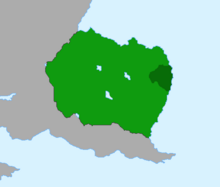Kembala language: Difference between revisions
Jump to navigation
Jump to search
mNo edit summary |
No edit summary |
||
| Line 13: | Line 13: | ||
| fam4 = X | | fam4 = X | ||
| script = {{Plainlist}} | | script = {{Plainlist}} | ||
* [[ | * [[Romassan script]] ([[#Orthography|Kembala alphabet]]) | ||
* [[Kembala Braille]] | * [[Kembala Braille]] | ||
{{Endplainlist}} | {{Endplainlist}} | ||
Revision as of 12:31, 19 April 2024
| Kembala | |
|---|---|
| Ikembali | |
| Pronunciation | /ikɛmˈbɑːli/ |
| Native to | USRN |
| Ethnicity | Kembala |
Native speakers | L1 speakers: 24 million. Combined L1 and L2 speakers: 152 million. (2020) |
| Official status | |
Official language in | |
Recognised minority language in | X |
| Regulated by | Kembala Language Institute |
| Language codes | |
| ISO 639-1 | kb |
| ISO 639-2 | kmb |
| ISO 639-3 | kmb |
 Geographic distribution of the Kembala language. Dark green: native region (Kembalia). Medium green: spoken by a majority alongside native languages. | |
Kembala, also known by its local name Ikembali, is a Kambu language spoken natively by the Kembala people. It is also used as a lingua franca in the USRN, where it is the only official language at the federal level. It is estimated to be spoken by about 152 million people worldwide, 24 million of which are native speakers.